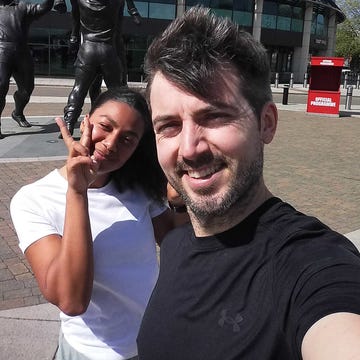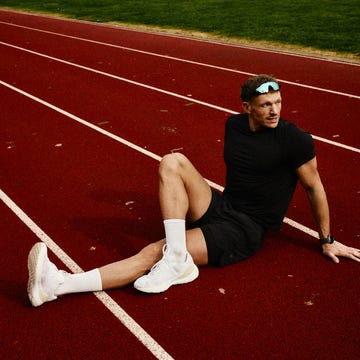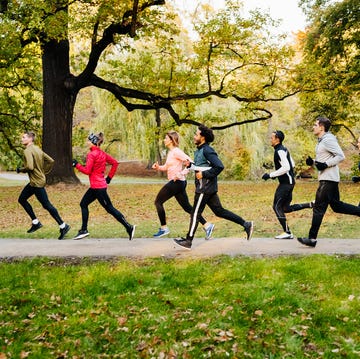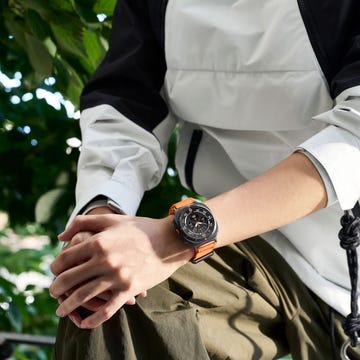You’ve followed a training plan to a tee, practised and perfected your race day nutrition and have a pacing strategy in place. But a bad night’s sleep before a big race can cast a shadow over even the best-laid plans and leave you feeling sluggish on the start line.
It doesn’t have to be this way. Just like other parts of the general health jigsaw, it’s possible to optimise your rest and recovery and boost your overall performance in the process. But how?
Sleep expert and host of the Reason & Wellbeing podcast Dr Greg Potter shares his advice on how you can improve your sleep health and reveals how the next generation of intuitive fitness watches can help you to achieve your sleep and recovery goals, from A to Zzz.
What everyone's reading
Get the guidelines
The National Sleep Foundation recommends that most adults between the ages of 18 and 64 should get between seven to nine hours of sleep per night. However, Potter adds that ‘there’s some wiggle room on either side – at the short end of the spectrum, they suggest that some will need about six hours a night, then at the long end, about 10 hours’.
Potter explains that physical activity like running can help to increase the length of your sleep, but that it is possible to have too much of a good thing. ‘There’s a sweet spot with levels of activity at which sleep is arguably best – and athletes with large training volumes or very strenuous training loads can get to a point of so-called overreaching, or overtraining, where their sleep pressure starts to break up.’
For a personalised deep dive into your current sleep status, Samsung’s latest launch, the Galaxy Watch Ultra, could be a worthy investment. With a built-in GPS system, impressive battery life and durable build, it’s a reliable running companion in its own right. But when it comes to recovery, its sleep tracking function keeps tabs not only on your sleep duration, but also on your sleep stages, heart rate, blood oxygen and even snoring. It then uses that data to give you helpful insights into where improvements could be made*.
Optimised recovery = optimum performance
Getting enough rest isn’t simply about meeting guidelines – it can have a direct impact on performance, too.
‘Sleep deprivation generally has a negative effect on endurance performance and that’s especially true of longer endurance exercise – anything lasting more than about 30 minutes,’ says Potter. ‘If you’re running a half marathon or a marathon, for instance, you’re probably going to be more compromised by the sleep loss than someone who’s running 200m.’
He adds that the impacts could be linked to reduced muscle energy stores, a reduction in pain tolerance, worse temperature regulation, compromised cognition and an increase in resting heart rate. ‘If you’re regularly not getting enough sleep, you’re not going to recover as well from your training and you’re going to be more susceptible to upper respiratory tract infections, like the common cold – and it makes you slightly more disposed to injuries as well,’ he says.
‘It goes both ways, though,’ he adds. ‘[It] has been less well studied, but there is certainly evidence showing that if you enhance your sleep, your performance will slightly benefit.’
The Galaxy Watch’s Energy Score metric is a valuable tool when it comes to monitoring your readiness for the race or training block ahead. It analyses your heart rate data, sleep metrics and activity levels to give you an AI-generated number out of 100 – a tangible indication of your overall condition and when you might need to rest*.
A holistic approach
Rather than focusing solely on duration or quality, Potter says that it’s important to look at the bigger picture of sleep health, which also includes regularity – ‘having a relatively consistent sleep-wake schedule’ – and ensuring that you’re meeting your energy intake needs through adequate nutrition. (This is a particularly important factor with increased training loads.)
‘Other things would include having an appropriate [amount of] time in bed each night,’ says Potter. ‘A lot of people who wake to an alarm in the morning and fall asleep quickly at night have quite high-quality sleep, but they just don’t get enough of it.’ To extend your sleep, his tips include setting your alarm as late as possible, having up to an hour’s lie-in on days off and getting lots of bright light exposure shortly after waking to anchor your body clock and make sure that it doesn’t drift later.
His final advice centres around promoting good sleep hygiene and minimising anything that could interfere with your ability to generate sleep. ‘I recommend people dial down their caffeine intake and finish it at least 12 hours before bed. Before bed, you don’t want to have too much alcohol and should reduce your exposure to anything that you find stimulating, including bright overhead light.’
But he stops short of saying that you should cut out all screen time. ‘It depends on the person, but I think that the negative effects of screen time on sleep have been overstated in recent years. There are some instances in which screen time probably is beneficial for sleep – if you’ve got a busy mind and you’re watching something on TV that just helps you to relax, that could well be supporting your sleep health.’
Discover more at samsung.com.
*Intended for general wellness and fitness purposes only. Requires smartphone operating on Android 11 or above with Google Mobile Services and the latest version of the Samsung Health app. Samsung account login and Galaxy smartphone is required for certain AI features.

Charlie Allenby is a London-based freelance writer with over a decade of experience writing about running, cycling and adventure sports for the likes of Runner's World, Cycling Plus, Cycling Weekly, Time Out London and The Guardian. His running journey started with the Royal Parks Half in 2017 and he's been hooked ever since, ticking off multiple marathons with a current PB of 2:43. In 2024, he started dabbling in the world of ultramarathons, pushing his body and mind to their limits in a Backyard Ultra (8 laps) and two laps of the Gloucestershire-based, Barkley-inspired Berkeley Marathons. Find him on LinkedIn



















